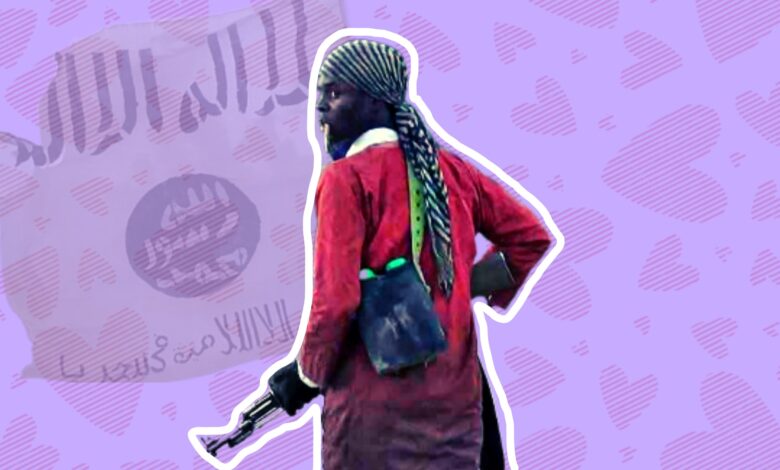
Resentment following how the Islamic State West Africa Province (ISWAP) treated some of the married couples within the rival terror group accounted for some of the desertions last year, HumAngle has learnt.
When ISWAP broke away from the Boko Haram faction previously led by Abubakar Shekau in 2016, its members had to sneak away under cover of night to save their lives and, as a result, could not leave with their wives. They would return five years later, seeking to seize what they believed was rightfully theirs.
Shekau, the late leader of the Jamatu Ahli Al-Sunna Lil Da’wa Wal Jihad (JAS), had learnt that some of his followers planned to revolt and had ordered for them to be rounded up and executed.
The plotters led by Abu Musab al-Barnawi alongside Mamman Nur got wind of Shekau’s directives. So, around 3 a.m. before the first Muslim call to prayer was made, hundreds of them escaped quietly, later forming the Islamic State affiliate, ISWAP.
HumAngle understands that Shekau had taken his time to indoctrinate the women the ISWAP defectors left behind and convince them that their partners were wrong to have plotted against him before marrying them off to JAS members.
So, when ISWAP returned in May 2021 to overrun the JAS stronghold in the Sambisa forest, many of its fighters saw it as an opportunity to finally reunite with their loved ones. The only problem was their wives now had new partners and children. Some of their daughters had also been assigned husbands.
The ISWAP leadership reacted by dissolving these marriages. The affected marriages are believed to be at least 500, considering many of the ISWAP fighters who decamped were polygamous. Mamman Nur was said to have left three wives behind, including the mother of Habib Yusuf (Al-Barnawi), son of Boko Haram founder Mohammed Yusuf. Al-Barnawi was ISWAP’s interim leader during the raid of the Sambisa enclave.
“The annulment of the marriages was not even the problem. Where there was a problem was when they said women could remarry in just one month,” one deserter told HumAngle.
The implication is that the women were treated as bounties of war and not bonafide members of the terror group.
According to Islamic law, a widowed or divorced woman must observe a waiting period of four months and 10 days, known as ‘idda. But this duration only applies to free women. Slave girls observe what is known as istibra’, which lasts for about a month.
“Istibra’ is observed in the case of a slave girl who changes ownership. It is one menstruation. Ownership changes by selling, giving away, capture, or any other way,” notes Islamic scholar Ibn Abi Zayd al-Qayrawani.
This approach cast doubt in the minds of the JAS members about their position within the ISWAP ranks and on whether the new sheriffs could be trusted. They had all pledged allegiance to ISWAP and expected to be treated fairly.
ISWAP had expected that the divorced women would return to their original partners, but this was not the outcome. Many of the women insisted they preferred to remarry their JAS husbands, and at least five said they wanted neither option. There was also pressure from many of the grown children, who were inclined towards being with their biological fathers.
Another implication of the complicated relationship between the women and their partners across different dispensations was that it would have led to pent-up rage, making it difficult for the extremist fighters to work together.
Those who defected, as a result, were not only the aggrieved JAS husbands and women who saw the divorce as a means of escape but also other displeased Boko Haram members who considered the incident a bad omen.
Some of the other factors behind the scale of surrender include the military’s favourable treatment of deserters, ISWAP’s superior firepower, as well as fundamental ideological and strategic differences between both groups.
Borno’s governor, Babagana Zulum, said weeks ago that over 30,000 people had so far surrendered to the Nigerian authorities from territories controlled by Boko Haram. They include civilians, combatants, and the families of insurgents. Currently, the state government has taken charge of their rehabilitation and reintegration, especially since the federal government’s Operation Safe Corridor (OSC) deradicalisation programme was not designed to admit so many people at once.
It, however, appears that the Borno government is overwhelmed by the number of persons involved. Deserters who spoke to HumAngle in February said some of them have returned to Boko Haram-controlled regions due to poor welfare conditions at the transit camps, especially in Bama.
Support Our Journalism
There are millions of ordinary people affected by conflict in Africa whose stories are missing in the mainstream media. HumAngle is determined to tell those challenging and under-reported stories, hoping that the people impacted by these conflicts will find the safety and security they deserve.
To ensure that we continue to provide public service coverage, we have a small favour to ask you. We want you to be part of our journalistic endeavour by contributing a token to us.
Your donation will further promote a robust, free, and independent media.
Donate HereStay Closer To The Stories That Matter





The sycophantic propagandists in the present Nigerian regime will always tell the public that it’s because the Nigerian military have defeated the two Islamist insurgent groups that have made the surrender of their fighters possible. It’s a pity that we cannot get any fact, how much more anything close to the truth, from a regime that has reduced the citizens to the level of disposable colonial subjects.